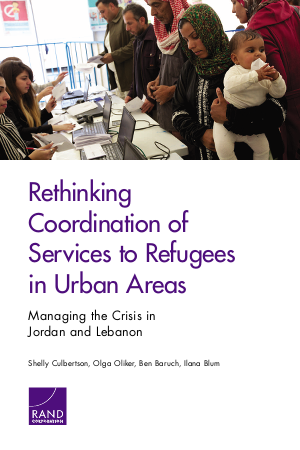
This report focuses on identifying ways to improve coordination of international and national entities managing the Syrian refugee response in urban areas in Jordan and Lebanon, particularly in the legal, employment, shelter, water and sanitation, health, and education sectors.
This report makes several contributions to the existing literature on this topic. First, it assesses the management model of a complex emergency response in urban areas in middle-income countries; most existing literature about humanitarian responses focuses on camps in weak states. Second, it brings together views of a broad spectrum of stakeholders to provide a comprehensive, multidimensional analysis of management of the Syrian refugee crisis in Jordan and Lebanon in particular. Third, this study presents a new framework for planning, evaluating, and managing refugee crises in urban settings, both in the Syrian refugee crisis as well as other such situations going forward. Fourth, it provides concrete recommendations for how to better support the needs of Syrian urban refugees in Jordan and Lebanon and for how to rethink refugee-assistance coordination around the world for improved effectiveness in the future.
This study drew on multiple methods: a literature review; interviews in Jordan and Lebanon with officials from donor countries, UN agencies, host governments, and nongovernmental organizations (NGOs); telephone interviews with international experts; and focus groups with refugees.
Resource collections
- Topics
- UN Habitat - Urban Response Collection
- Urban Response - Urban Crisis Preparedness and Risk Reduction
- Urban Response Collection - Community Engagement and Social Cohesion
- Urban Response Collection - Economic Recovery
- Urban Response Collection - Environment and Climate Change
- Urban Response Collection - Housing, Land and Property
- Urban Response Collection - Urban Crisis Response, Recovery and Reconstruction
- Urban Response Collection - Urban Resilience
